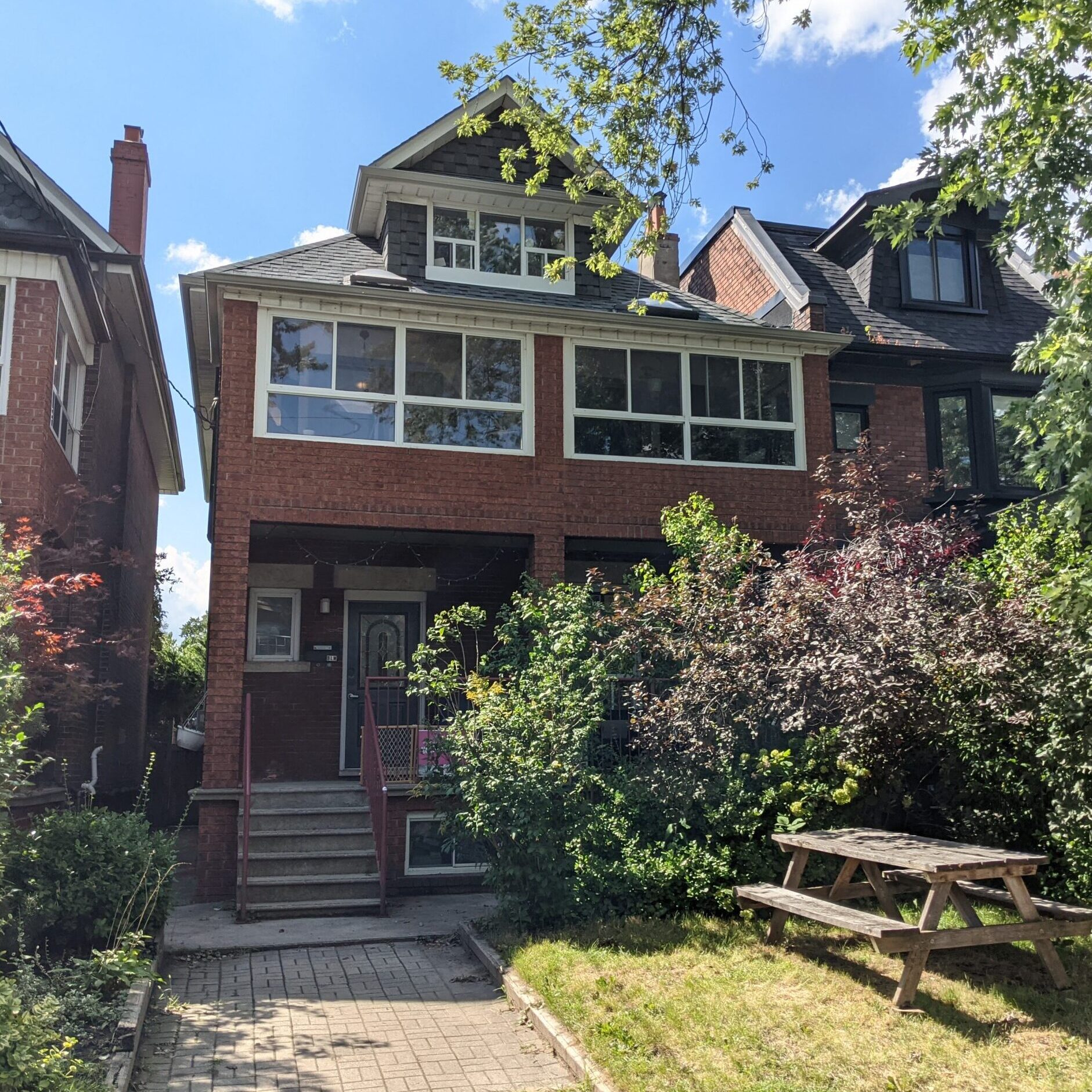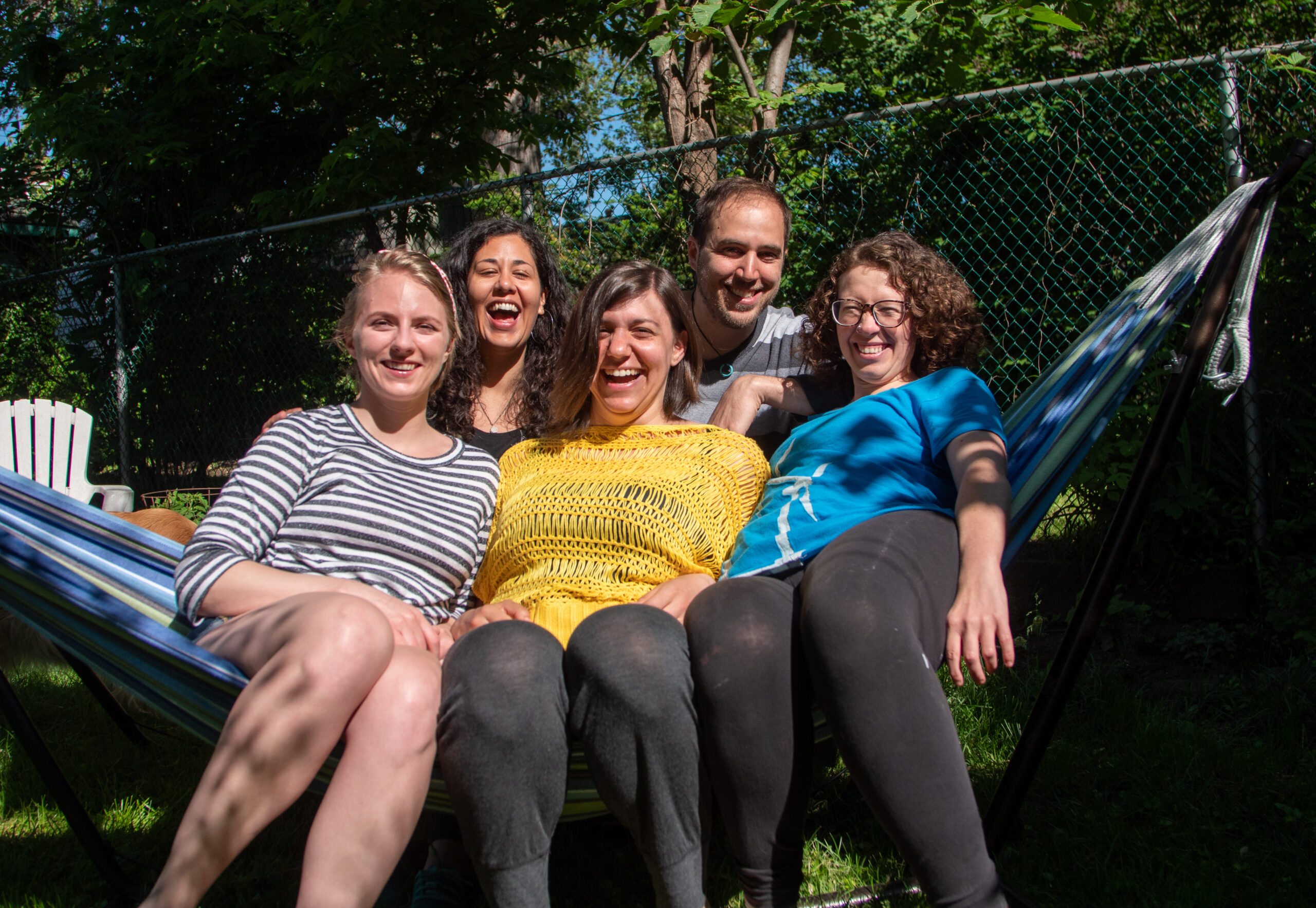THE GREEN LINE GUIDE TO...
Co-Housing
In The City

📸: Provided by Karim Rizkallah.
WITH Karim Rizkallah

Alex Varoutas
Scarborough mans and former chef. Big advocate of pantry diversification. Using wasabi-flavoured peanuts to heal the world.
September 10, 2021
Defining
the problem
In 2022, the average price of a house in Toronto broke records when it passed $1.3 million. As the price of housing continues to rise, some young Torontonians are looking for alternative options. One such option is co-housing, where multiple people buy a property and live communally. Karim Rizkallah is among those who have taken this approach. He walks The Green Line through his process, from choosing your housemates to finding the right house and legal arrangement.
Meet
Karim
Karim Rizkallah, 38, lives in Brockton Village near Lansdowne Street and College Avenue. When he and five other housemates bought a detached, seven-bedroom house together in 2019, the story made news worldwide and was covered by Vice, Toronto Star and The Christian Science Monitor.

📸: Provided by Karim Rizkallah.
Figure out
what you need
According to Rizkallah, the first thing you need to do is get a clear idea of what you’re looking for because not all co-housing situations are the same. Some involve a more open relationship with your housemates and feature plenty of communal spaces and room for interaction. Others can be the opposite, where priority is on personal space, but includes a shared kitchen or common area. Rizkallah says you may need to compromise if you want to find an arrangement that works. If you’re getting caught up on small details like neighborhood and paint colours, he adds, you may struggle to find a place that works for everyone.
Talk about
everything
A co-housing setup like this requires a lot of transparency around touchy issues like finances. These conversations start before any contract is ever signed, and carry through to the day someone leaves. From how much money and debt you have to what your spending habits are like, everything is out in the open. Having this kind of open-book relationship makes it easier to deal with obstacles as they arise. It also makes it easier to plan ahead. For example, Rizkallah and his housemates have a “life happens” clause in their contract; if someone hits a point in their life where their circumstances change and they want to move out, contingency plans are already in place for how to deal with that.
Find the
right house
Naturally, finding the right house is a crucial step in the process. Making sure everyone’s needs are met without too much compromise on any one person's part will take time and diligence. Renovations aren't off the table but anything that involves changing the structure or a capital expense will have to be a group decision. In Rizkallah's case, having a common space that’s built into the house, like a kitchen or living room where all the housemates can run into each other, was a very important feature.
“We have a sort of, typically, slightly uncomfortable relationship with talking about money. But it is really important...to put it all on the table.’”
KARIM RIZKALLAH
38, BROCKTON VILLAGE
Sign a legal
agreement
Having a solid legal agreement that everyone agrees upon will help clarify how ownership is divided up, who pays for what expenses and how to handle changes down the road. It also makes getting a mortgage easier since banks will want to see a legal document before lending money. Should a conflict arise, the legal agreement would serve as the final word, though Rizkallah says resolutions are usually reached without the need to cite a contract in his house.
“Co-housing is a rollercoaster of relationships. People leave because…life happens and it’s sad. And then people join, and it’s really exciting.”
KARIM RIZKALLAH
38, BROCKTON VILLAGE
Eat
together!
A regular meal or movie night helps builds and maintain healthy relationships among housemates. By building these events into everyone's schedule, no one bears the responsibility of having to plan something and coordinate with everyone else.
”We found it really essential and really enjoyable to have built-in weekly meals or movie nights," Rizkallah says. "That level of interaction means that you’re not only sort of building a relationship at meetings over, you know, business items, but that you’re also hanging out and getting to know each other."
And in
Conclusion
Rizkallah isn’t the first person to co-own a house with others. This living arrangement has been used around the world for decades. It’s easy to think of co-housing as just a means of getting a foothold in Toronto’s housing market. But for many people, the allure of co-housing is the prospect of being part of a small, tight-knit community.
Throughout the first year of lockdowns, Rizkallah says there wasn’t really a time when he felt as alone or isolated as other Torontonians seemed to be. While in quarantine, they had movie nights and dance parties together, so at any given time, he had a community of housemates to turn to.
Next Steps and
Resources
Actions
Next steps for people who want to take action,
but don’t know where to start.
Define
Your Priorities
Taking time to figure out what you want is the first big step in the co-housing process. Once you have a clear idea of factors, including where you're willing to live and what kind of housing arrangement you want, you can begin to find options that fit your needs.
Find a
Community
Although co-housing is still new to many people in Canada, there are local organizations and grassroots groups that provide resources for how to start the process. They can help connect you with people who've successfully co-housed, and answer frequently asked questions.
Talk to
Your Bank
Getting a mortgage to co-own a house with other people isn't as straightforward as your average mortgage application. Talking to your bank can give you an idea of what they can offer and what documents you'll need when you apply.
Join Our
Community
Gather with other like-minded Green Line community members to discuss and share tips for co-housing.
Resources
Community-curated resources
to help you take action.




